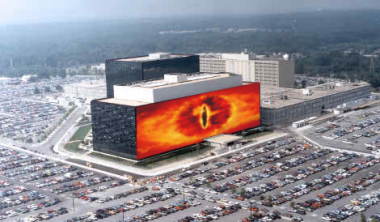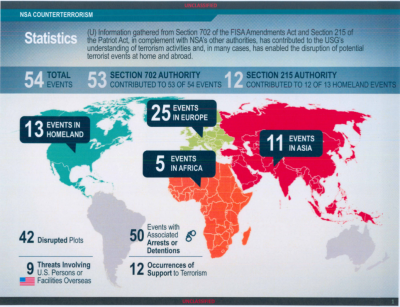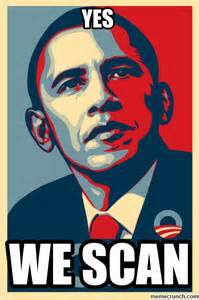Internet/Surveillance
(Mass surveillance) | |
|---|---|
 | |
| Interest of | Yasha Levine |
| Wholesale surveillance of the citizenry is the new normal, introduced under the smokescreen of the "war on terror". | |
The Internet is monitored as never before'...
Contents
Official narrative
The official narrative is that mass surveillance of the internet is needed as part of the "war on terror" to prevent the nebulous threat of cyberterrorism. NSA director Keith Alexander has repeatedly lied about the illegal mass surveillance programmes, including the spurious but often repeated claim that mass surveillance "thwarted" 54 terror events. Under questioning about this, he reduced that number to one, which did not itself withstand close scrutiny.[1] The correct figure would appear to be zero.[2][3]
Technical aspects
Large scale surveillance is carried out routinely by a variety of strategies. Individual, personalised, surveillance is carried out against specific targets.
Software
Closed source software, such as that provided by Apple or Microsoft should be assumed to have no effective ability to prevent surveillance against the deep state, whatever 'privacy settings' are presented and whatever claims are made to the contrary.
Open source software allows users to inspect the source and thus (if they have sufficient technical skill) to understand what the software is doing.
Security researchers have uncovered systematic abuse by internet service providers in USA, including injection unique identifiers into users' web traffic to allow easy construction of personal browsing profiles.[4]
By 2017, hundreds of the most popular websites were using “session replay scripts” to capture every click and keystroke to allow site operators to access information that users didn't actually submit.[5]
Hardware Backdoors
In 2014 it was revealed via Edward Snowden that the NSA routinely backdoors networking hardware exported from the USA.[6]
Legal status
The legal status of mass internet surveillance is seldom questioned by the commercially-controlled media. Many national governments have passed legislation to try to prevent anonymous internet access, for example, by mandating a registry of all internet users and obliging ISPs to save connection and IP address data. Even one decade ago many countries still had consumer privacy legislation in force which mandated the exact opposite, but such legislation was overturned and monitoring is quickly becoming the rule rather than the exception.
Australia
In September 2014, Australian laws were being read which allows law enforcement agencies to obtain a warrant to access data from a computer — but which also redefine “a computer” to mean not only “one or more computers” but also “one or more computer networks”. Since the Internet itself is nothing but a large network of computer networks, it seems difficult to avoid the conclusion that the bill may allow the spy agency to carry out surveillance on the entire Internet with a single warrant.[7]
New Zealand
In May 2014, New Zealand passed the Telecommunications (Interception Capability and Security) Act (TICSA), which mandates that ISPs use specified hardware for their networking and would only be allowed to build a network subject to certain specifications. They must get government approval for their building of internet infrastructure and must ensure that government agencies can access customer data and connections when needed.[8]
UK
GCHQ have admitted to collecting millions of images from unwitting computer users' webcams, some of which are pornographic in nature.[9] In response to a lawsuit by a coalition of internet privacy groups, Charles Farr, the Director General of the Office for Security and Counter Terrorism, claimed that the indiscriminate interception of UK residents use of Facebook, Google, Hotmail and Twitter was by UK law because they qualified as "external communications", since the platforms were located in US.[10]
US
In contrast to Barack Obama's public claim that he "welcomes" a debate on government surveillance, the US federal government has been secretly advising local police forces not to disclose details about mass surveillance technology suich as the 'Stingray' with which they are sweeping up cellphone data from entire neighborhoods.[11]
Clapper v. Amnesty International
- Full article: Clapper v. Amnesty International
- Full article: Clapper v. Amnesty International
According to Jameel Jaffer, deputy legal director of the ACLU, who argued Clapper v. Amnesty International before the US Supreme Court which challenged amendments made in 2008 to the Foreign Intelligence Surveillance Act essentially allow the National Security Agency (NSA) "to engage in dragnet surveillance of Americans’ international communications", even those "who might not be suspected at all of having done anything wrong," so that "it’s a very broad surveillance statute", "arguably broader than any surveillance statute that Congress has sanctioned in the past."[12] The US Supreme Court, by requiring the plaintiffs to show that they, themselves, have been monitored under the law, has essentially created a barrier to judicial review preventing anyone from ever challenging this kind of statute in court as, indeed, nobody can show that they have been monitored under the law since the government is not disclosing its targets.[12]
Related Quotation
| Page | Quote | Author |
|---|---|---|
| National Security Agency | “Your Data: If You Have Nothing to Hide, You Have Nothing to Fear” | National Security Agency |
References
- ↑ http://leaksource.info/2014/01/08/nsa-four-whistleblowers-memo-to-obama-input-for-your-decisions-on-nsa/
- ↑ http://www.pclob.gov/SiteAssets/Pages/default/PCLOB-Report-on-the-Telephone-Records-Program.pdf
- ↑ http://en.alalam.ir/news/1525126
- ↑ https://www.techdirt.com/articles/20150115/07074929705/remember-that-undeletable-super-cookie-verizon-claimed-wouldnt-be-abused-yeah-well-funny-story.shtml
- ↑ https://motherboard.vice.com/en_us/article/59yexk/princeton-study-session-replay-scripts-tracking-you
- ↑ http://www.theguardian.com/books/2014/may/12/glenn-greenwald-nsa-tampers-us-internet-routers-snowden
- ↑ https://www.eff.org/deeplinks/2014/09/australian-government-scrambles-authorize-mass-surveillance
- ↑ http://www.itnews.com.au/News/385149,tough-nz-comms-interception-network-security-law-kicks-in.aspx
- ↑ http://mashable.com/2014/02/27/gchq-webcam-yahoo-images/
- ↑ https://www.privacyinternational.org/press-releases/uk-intelligence-forced-to-reveal-secret-policy-for-mass-surveillance-of-residents
- ↑ http://bigstory.ap.org/article/us-pushing-local-cops-stay-mum-surveillance
- ↑ a b "ACLU Blasts Supreme Court Rejection of Challenge to Warrantless Spying Without Proof of Surveillance". Democracy Now!. February 27, 2013. Retrieved 21 April 2013.Page Module:Citation/CS1/styles.css must have content model "Sanitized CSS" for TemplateStyles (current model is "Scribunto").

